�
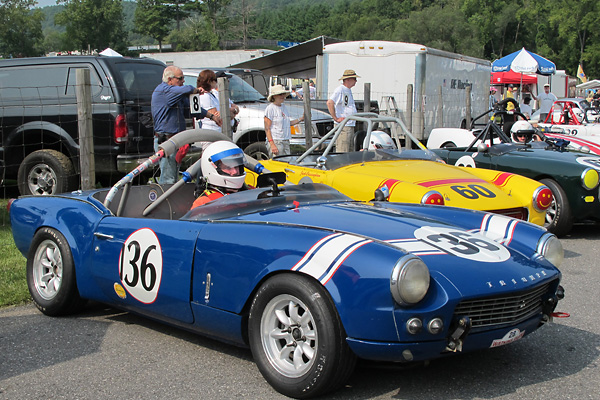
�
�
Richard Brown's 1964 Triumph Spitfire Race Car
� � Owner: Richard Brown� City: East Hampton, Connecticut
� Chassis: 1964 Triumph Spitfire
� Engine: 1296cc four cylinder
� Race prepared by: Nick Julian�
�
From SCCA to Vintage Racing
��
Built in the early seventies by a racer in the Atlanta Georgia area, this Triumph Spitfire�
has a long SCCA racing history. Richard Brown bought it, and together with his friend�
Nick Julian he has been vintage racing it for about six years.�
�
This Spitfire is a consistent front runner. We noticed two details that may contribute�
to its excellent results. First, it seems to be set up with more negative rear camber than�
most Spitfires. Secondly, its engine is set up with more modern carburetors that we're used�
to seeing on a vintage racecar. �
�
�
Enjoying this article? www.BritishRaceCar.com is partially funded through generous support from readers like you!
�
To contribute to our operating budget, please click here and follow the instructions.
�
(Suggested contribution is twenty bucks per year. Feel free to give more!)�
Features and Specifications
�| Engine: | �1296cc Triumph four cylinder engine.�
(Stock dimensions were 2.90" bore by 2.99" stoke. Class rules allow a 0.047" overbore.)�
Flat top pistons.�
~12.5:1 static compression ratio.�
Dual Mikuni HSR series 1.75" carburetors.�
Lucas distributor.�
Bosch "blue" ignition coil.�
MSD spark plug wires.�
AccuSump oil accumulator. | �
| Cooling: | �Triumph Herald copper and brass radiator (Stanpart/Coventry Radiator & Presswork Co. Ltd.).�
Setrab oil cooler, part# 50-619-7612. | �
| Exhaust: | �Stahl Headers four-into-one exhaust header.�
No muffler. | �
| Transmission: | �Spitfire gearbox with close-ratio gears. | �
| Rear End: | �Welded differential. | �
| Front Susp.: | �Carrera coilover shock absorbers.�
475#/inch springs.�
1" anti-sway bar.�
Triumph Spitfire steering rack (unmodified). | �
| Rear Susp.: | �custom, heavier-than-stock transverse leafspring (~175#/inch).�
Carrera "Hyper-Charged" steel body shock absorbers.�
Strange Engineering axles. | �
| Brakes: | �(master) dual Girling 5/8" bore master cylinders with integral reservoirs and bias bar. � (front) Girling calipers � (rear) Tilton lever-type brake proportioning valve. | �
| Wheels/Tires: | �Panasport Racing 13x6 ("6-JJx13") aluminum 8-spoke wheels.�
Hoosier Street T.D. S (A70-13) tires. | �
| Electrical: | �gear reduction starter.�
Lead/acid battery. | �
| Instruments: | �(left to right)�
Jones mechanical tachometer (1000-10,000rpm),�
AutoMeter oil pressure gauge (0-100psi),�
AutoMeter oil temperature gauge (140-280F), and�
AutoMeter water temperature gauge (140-280F). | �
| Fuel System: | �ATL SP108 8-gallon fuel cell.�
Holley "red" electric fuel pump.�
Holley adjustable fuel pressure regulator (1-4psi). | �
| Safety Eqmt: | �Kirkey aluminum racing seat.�
Beltenick six point cam-lock safety harness.�
Troyer quick release steering wheel hub mounted on a Mountney of Britain steering wheel.�
Kidde handheld fire extinguisher. | �
 �
�
�
�
Engine Installation
��
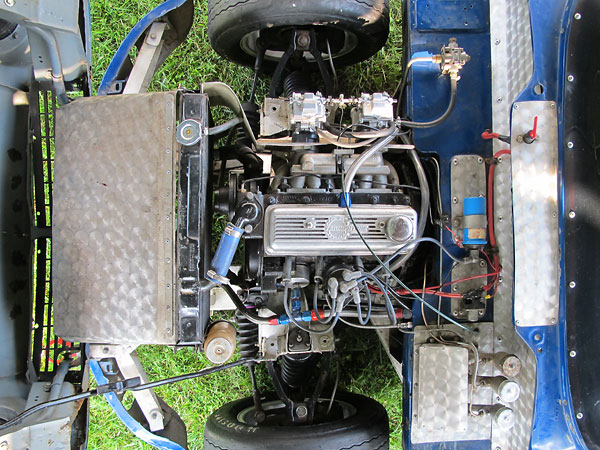
�
1296cc Triumph four cylinder engine.
�
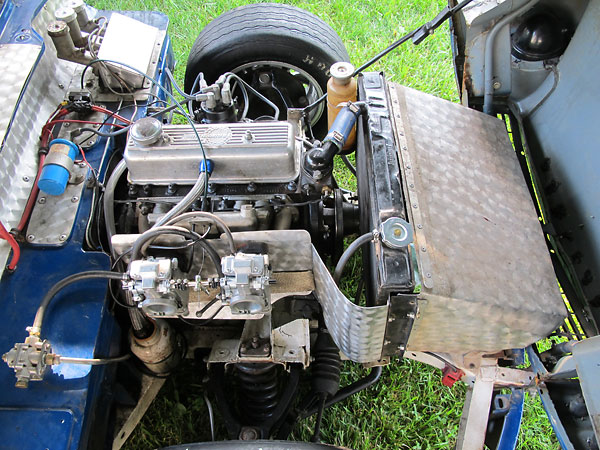
�
A fabricated aluminum air shroud directs air into the radiator. A couple baffles and
�
shields have been added to help direct warm air away from the carburetors.
�
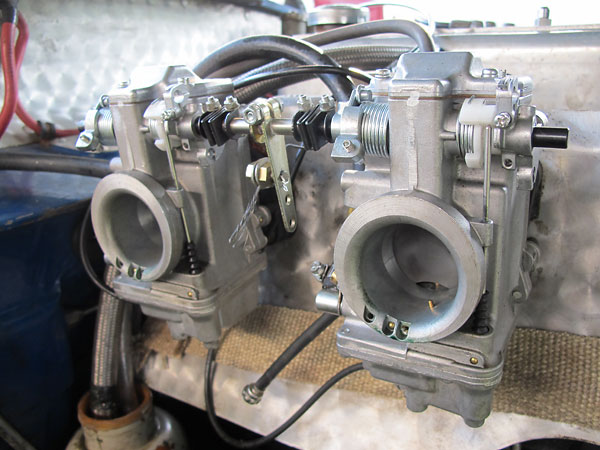
�
Dual Mikuni HSR 45mm smoothbore/flatslide motorcycle carburetors.
�
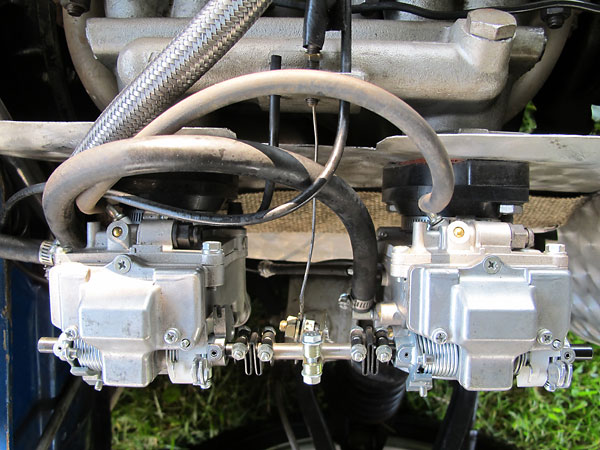
�
Mikuni originally developed their HSR series (42, 45, and 48mm flatslide) carbs as aftermarket
�
upgrades for Harley Davidson motorcycles. Lately, they're becoming a popular upgrade for sportscars
�
and racecars. Neat adapter flanges attach the Mikuni carbs to this regular Triumph intake manifold.
�
Please support the sponsoring companies who make www.BritishRaceCar.com possible, including:
� �
 �
�
�
�
�
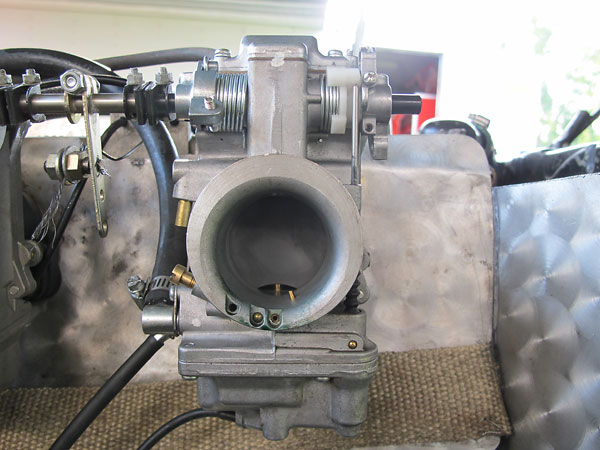
�
Mikuni HSR carburetors cost significantly less than Weber DCOE sidedraft carburetors
�
which additionally require special manifolds and often pricey linkage kits. For those
�
who prefer to have one choke per cylinder, quad Mikuni HSR kits are also available.
�
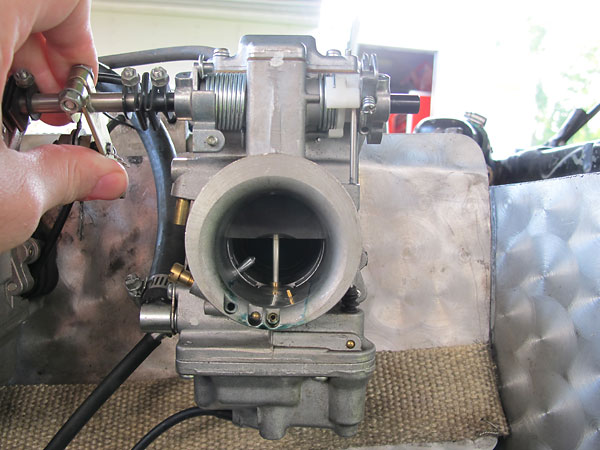
�
Mikuni HSR carburetors feature "flat slide" throttle plates in lieu of hinged "butterflies". Similar slides
�
were used many years earlier on race-bred Lucas fuel injection systems. Advantages of Mikuni HSR
�
carburetors compared to SU carbs include better fuel atomization and greater maximum airflow.
�
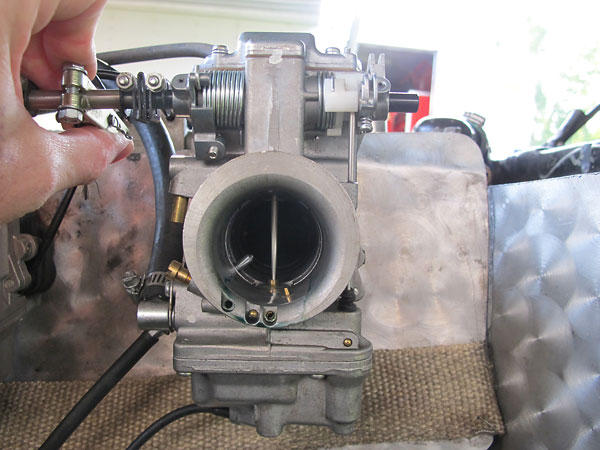
�
Mikuni HSR carbs feature double-adjustable accelerator pumps for superior throttle response.
�
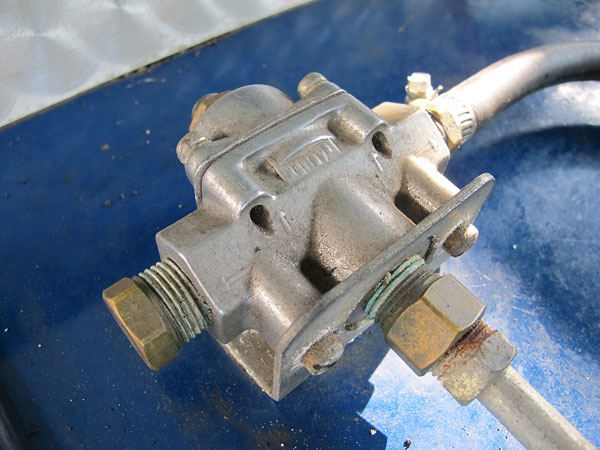
�
This Holley fuel pressure regulator is adjustable from one to four pounds per square inch.
�
Mikuni HSR carburetors were originally designed for motorcycle installations where fuel is fed via
�
gravity. To suit use with a fuel pump, Mikuni experts at Vintage Performance Developments always
�
substitute a smaller float bowl needle and seat (specifically, size 2.3 in lieu of size 4.0). This modest
�
adaptation ensures the Mikuni HSR bike carbs perform well with typical 3-4psi fuel supplies.
�
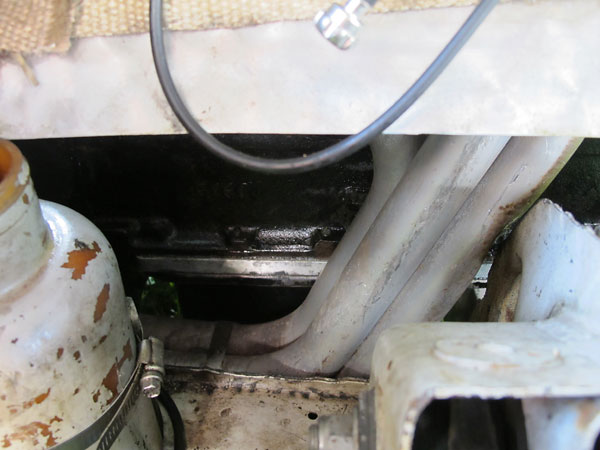
�
Jere Stahl of Stahl Headers (York PA) has been a pioneer in the header business since ~1963. In the
�
early 1960s, tri-y headers dominated the market. Stahl pioneered the shift to 4-into-1 designs.
�
At the time, they were generally called "four tube" or "independent" headers.
�
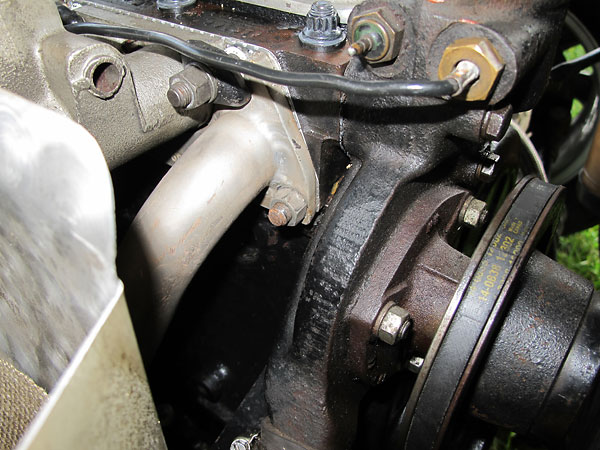
�
Stahl headers are fabricated from mild steel using oxy-acetylene welded joints. Heat from the torch
�
anneals the area around welds, resulting in headers that are more resistant to cracking. The outboard
�
side of cylinder head flange joints are brazed to spread loads over a larger area of the mating tubes.
�
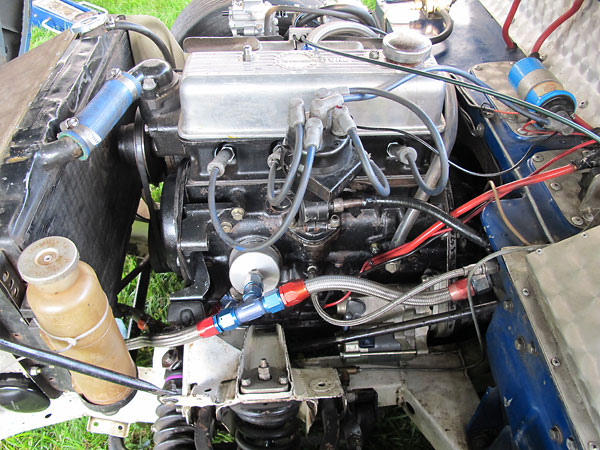
�
Lucas distributor, Bosch "blue" ignition coil, and MSD spark plug wires.
�
Note also the drive cable for a mechanical tachometer.
�
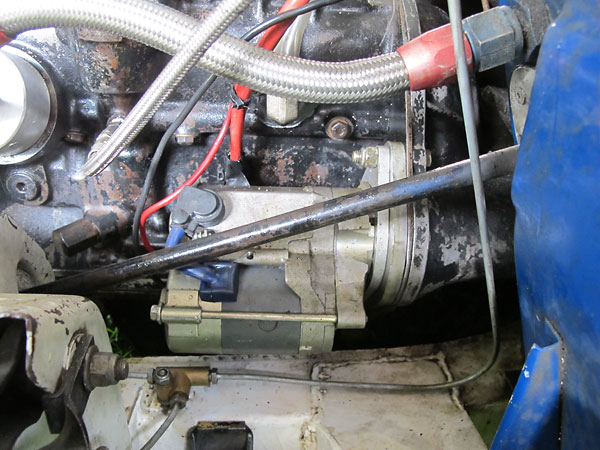
�
Gear reduction starter.
�
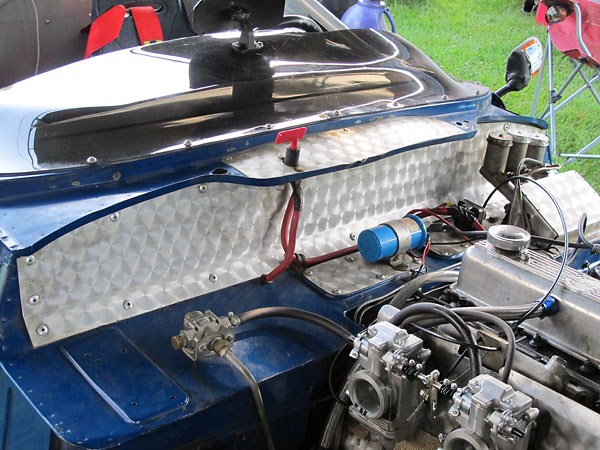
�
Engine turned aluminum panels provide a classic look. A Scotch-Bright cleaning disc
�
mounted in a drill press or milling machine will create this elaborate brushed effect.
�
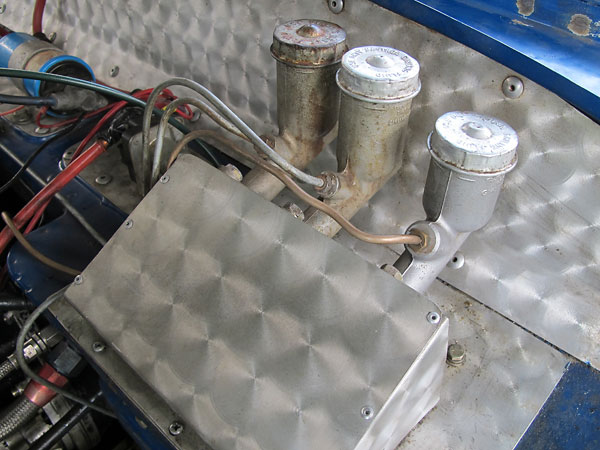
�
Dual Girling 5/8" bore master cylinders with integral reservoirs and bias bar.
�
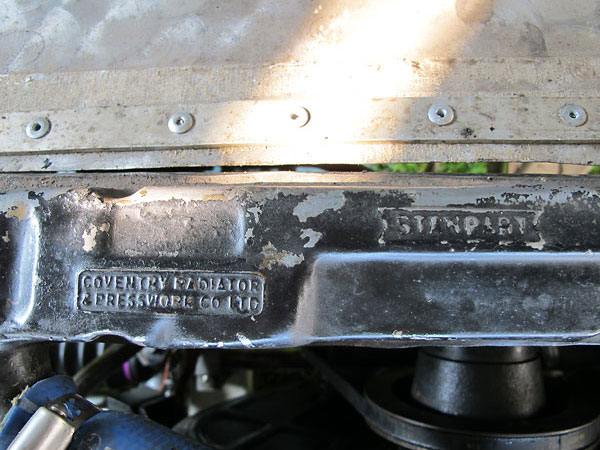
�
Instead of a regular Triumph Spitfire radiator, a larger Triumph Herald radiator is used.
�
It's stamped "Coventry Radiator & Presswork Co. Ltd." and "Stanpart".
�
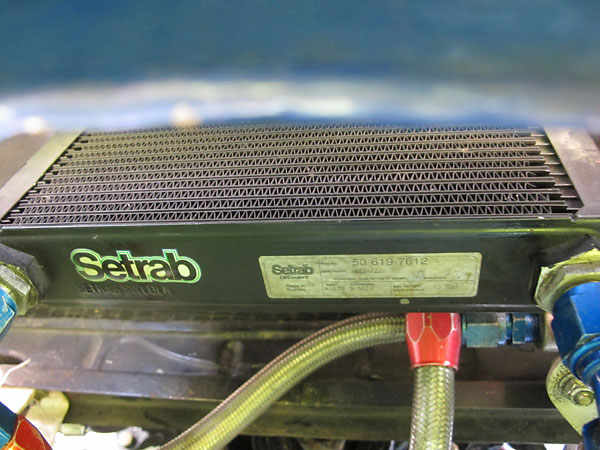
�
Setrab oil cooler, part# 50-619-7612.
�
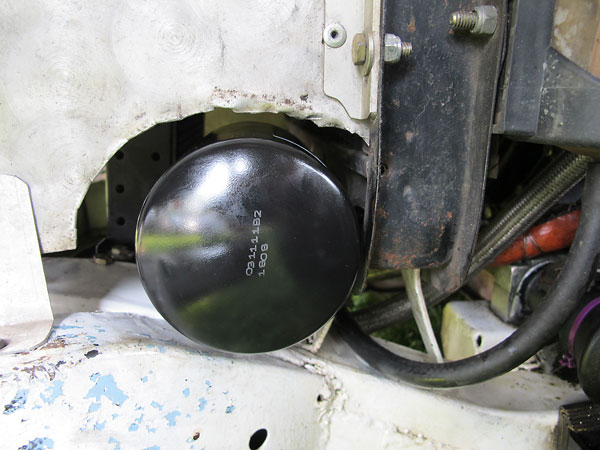
�
Remotely mounted oil filter.
�
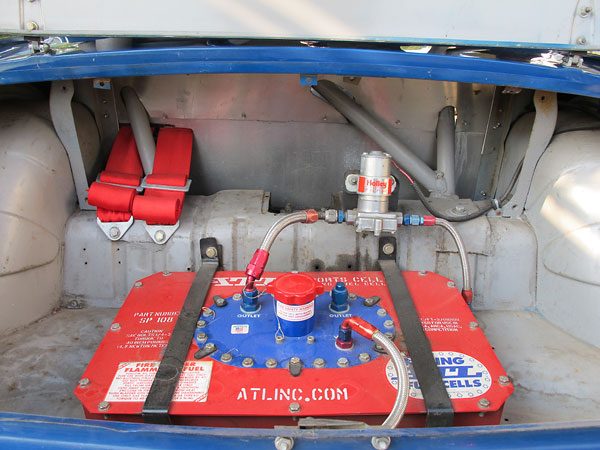
�
ATL SP108 8-gallon fuel cell. Holley "red" electric fuel pump.
�
 �
�
�
�
Front Suspension
��
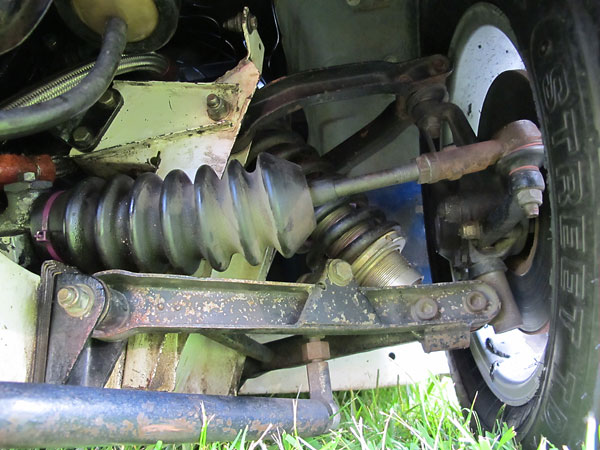
�
1" front anti-sway bar.
�
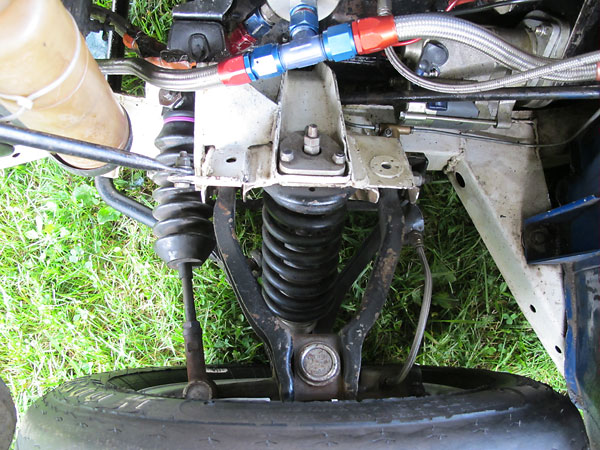
�
Carrera coilover shock absorbers with 475#/inch springs.
�
�
Rear Suspension
��
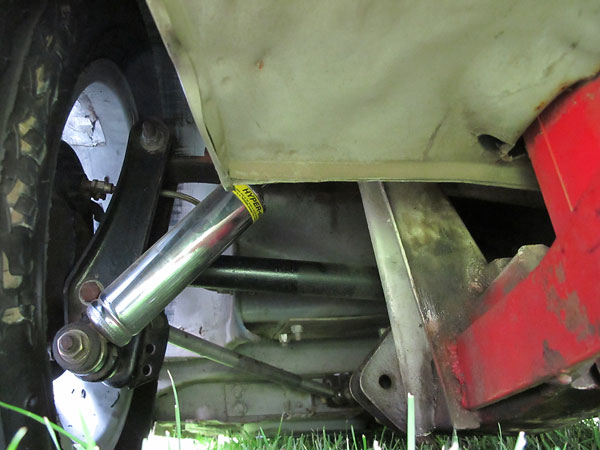
�
Spitfires feature swing axle rear suspensions and transverse leafsprings. This particular Spitfire
�
has a custom leafspring, dimensioned to give a low ride height and a lot of negative tire camber.
�
Fewer but thicker leafs are used to control "droop" in the unladen wheel when cornering hard.
�
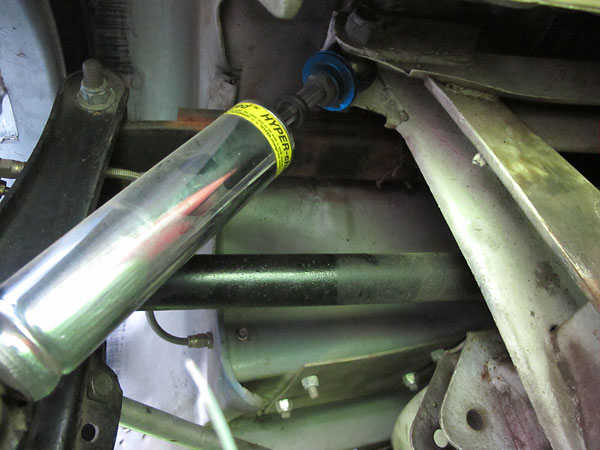
�
Carrera "Hyper-Charged" steel body shock absorbers.
�
�
Interior
��
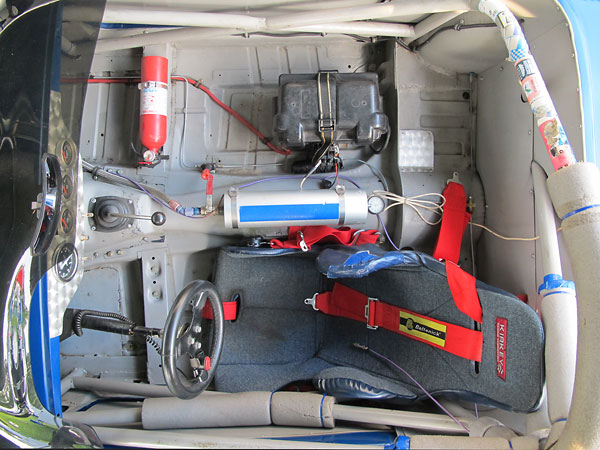
�
Strong roll cage.
�
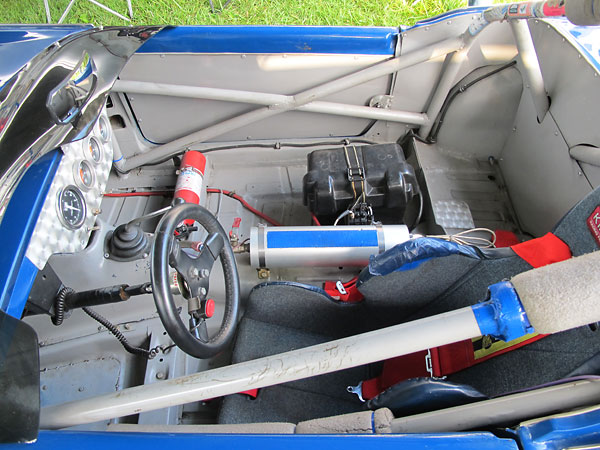
�
The aluminum cylinder on the driveshaft tunnel is an AccuSump oil accumulator. This device stores
�
pressurized engine oil that the driver can release before starting his engine. For ease of use,
�
its manually operated valve has been placed within comfortable reach.
�
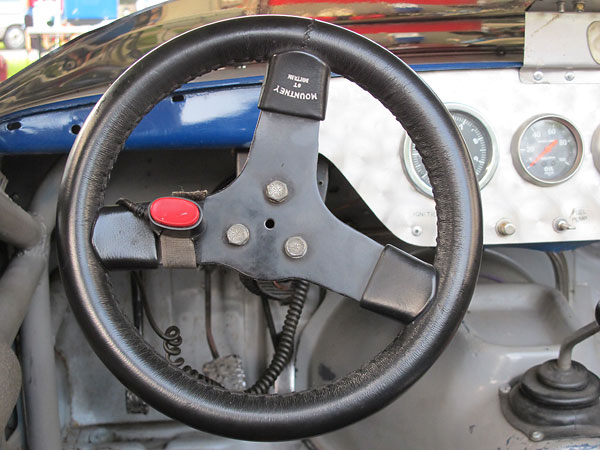
�
Mountney of Britain leather wrapped steering wheel.
�
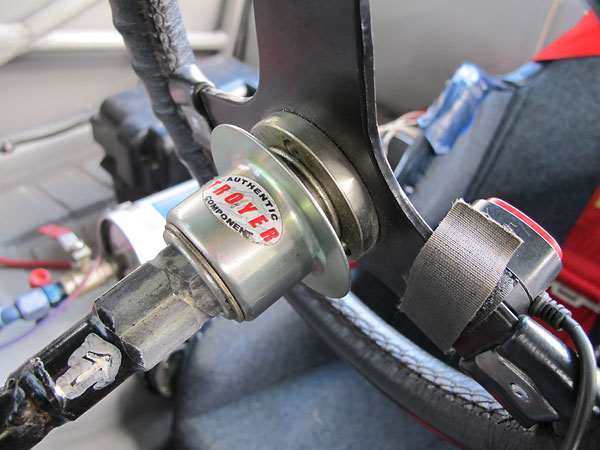
�
Troyer quick release steering wheel hub.
�
�
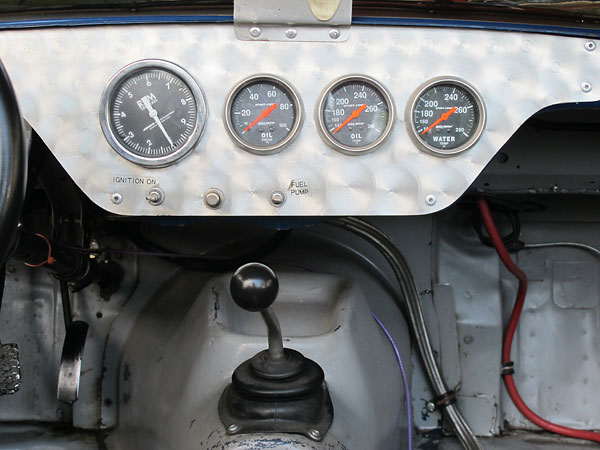
�
Jones mechanical tachometer. AutoMeter oil pressure, oil temp, and water temp gauges.
�
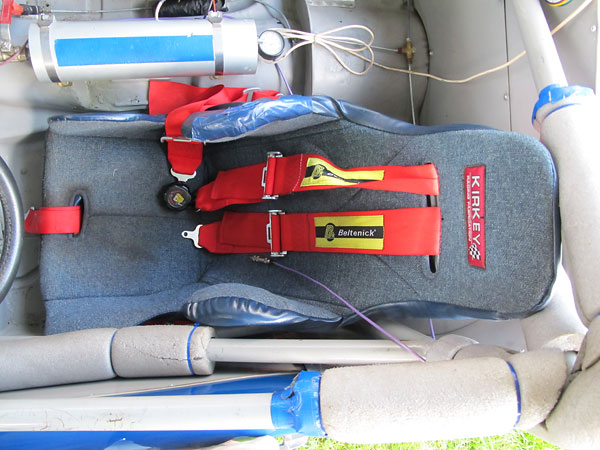
�
Kirkey aluminum racing seat. Beltenick six point cam-lock safety harness.
�
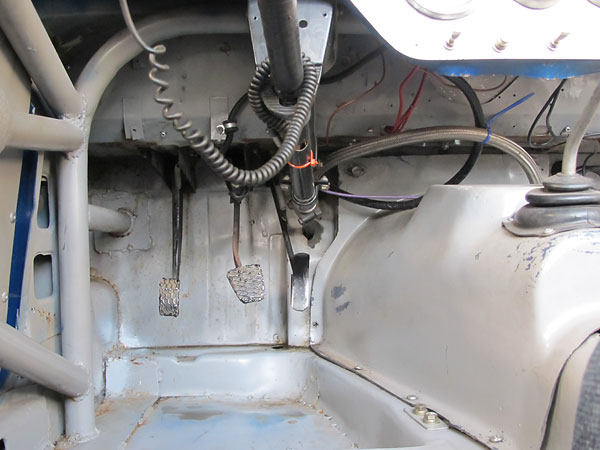
�
Removable transmission cover.
�
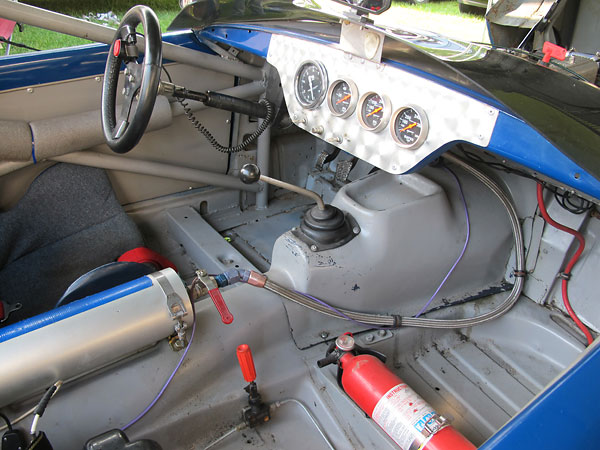
�
Tilton lever-type brake proportioning valve.
�
�
Exterior
��
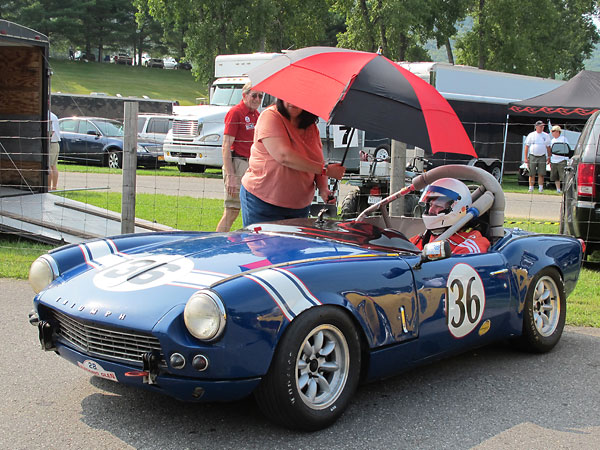
�
At the 2011 Lime Rock Historic Festival, Richard Brown and his Triumph Spitfire placed third of 31 cars
�
in the Group 5 race for "Small Bore Production" cars. He circled the 1.51 mile circuit with best lap time
�
of 1:06.675, for an average speed of 81.53mph! Monday's Group 5 race was slowed by rain, but
�
Brown showed his versatility by finishing 3rd of 23 starters (1:19.575, 68.31mph.)
�
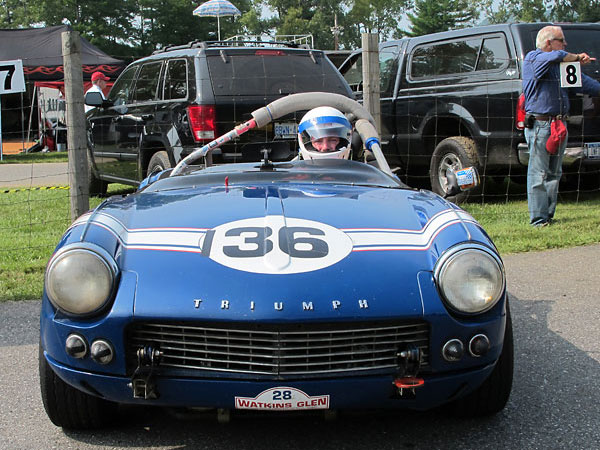
�
Classic Triumph livery: the transverse racing stripe evokes a finish-line ribbon.
�
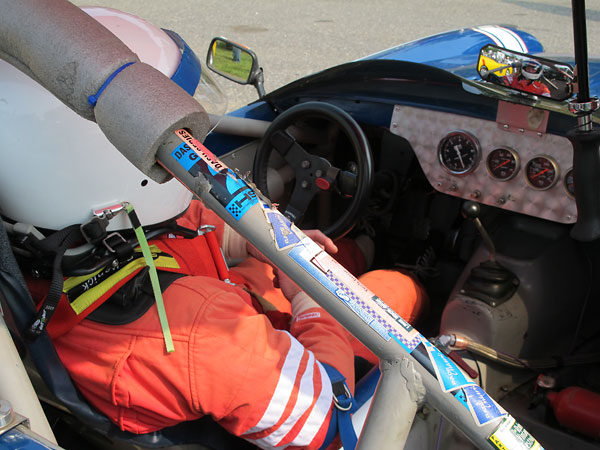
�
Whiplash caused neck and spinal cord injuries are real killers. In this regard, the extra weight of a helmet
�
doesn't help the driver. HANS (head and neck support) devices are engineered to control head motion
�
and to protect the neck and spine. Most racer don't realize it, but this technology goes back 25 years
�
to 1986 when professional racer Jim Downing first wore a HANS device in an IMSA race.
�
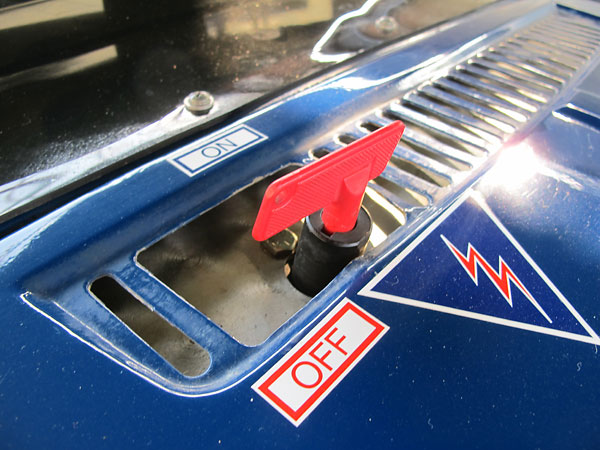
�
Hella battery disconnect switch.
�
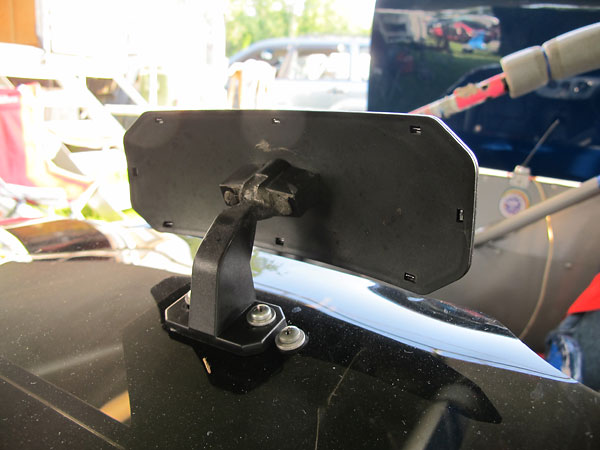
�
Panoramic view rear view mirror.
�
�
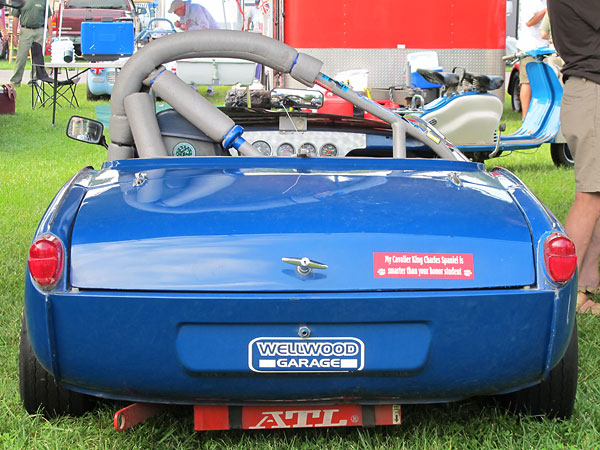
�
How can you tell which cars are quick before they even leave the paddock?
�
Ride height is one of the best clues. Lower cars usually lead their class.
�
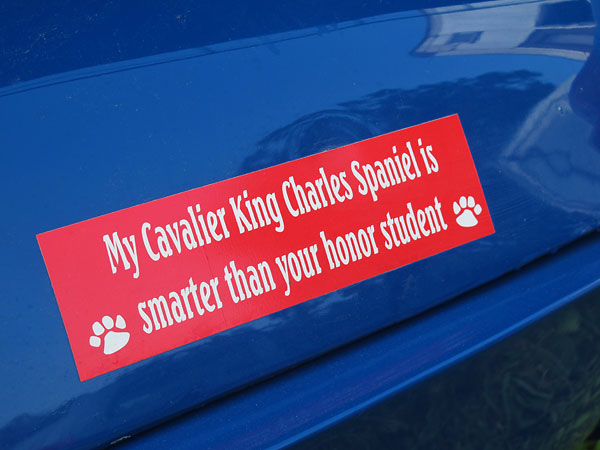
�
"My Cavalier King Charles Spaniel is
�
smarter than your honor student"
�
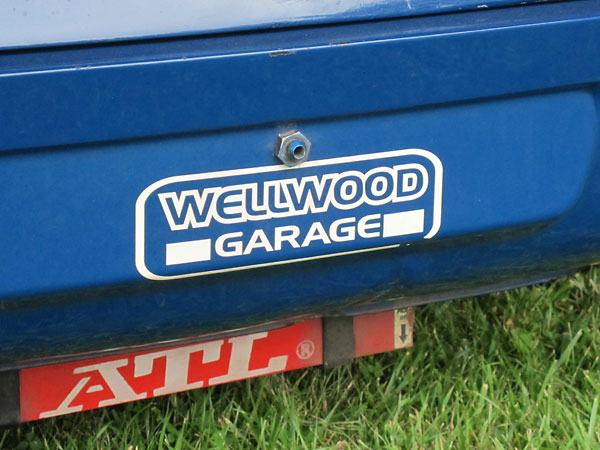
�
Wellwood Garage (of Syracuse, New York)
�
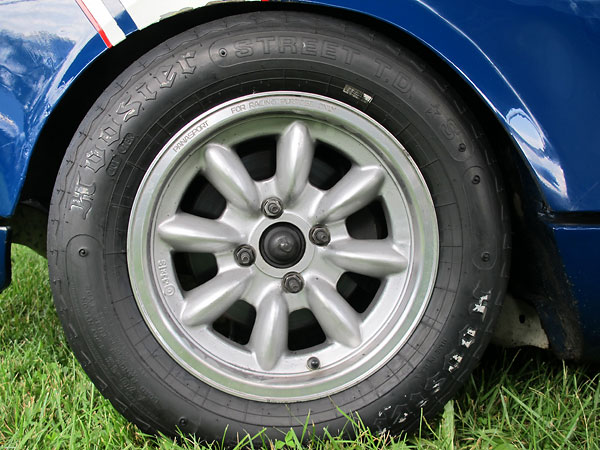
�
Panasport Racing 13x6 ("6-JJx13") aluminum 8-spoke wheels and Hoosier Street T.D. S (A70-13) tires.
�
Latest thing: Hoosier's new "S" designation indicates stiffer sidewall construction.
�
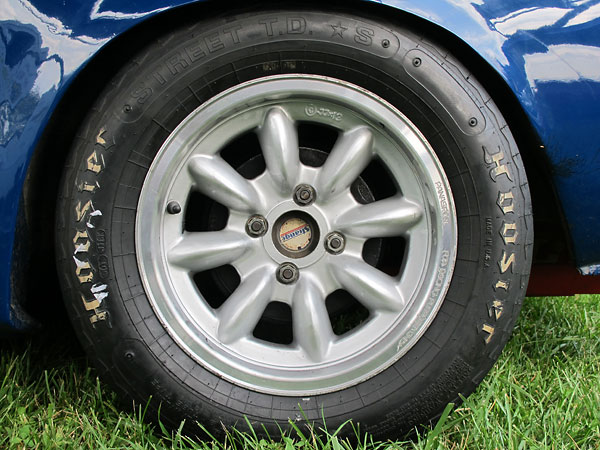
�
Strange Engineering rear axles. (Strange Engineering Inc., Evanston Illinois.)
�
�
�
Unless otherwise noted, all photos shown here are from September 2011 when we viewed the car at�
The 29th Annual Historic Festival at Lime Rock Park in Connecticut.�
All photos by Curtis Jacobson for BritishRaceCar.com,�
copyright 2012. All rights reserved.
�
| If you liked this article, you'll probably also enjoy these: | �|||||
 | �
Pat Ryan '67 Triumph Spitfire | �
 | �
Chuck Pitt '68 Spridget | �
 | �
Scott Janzen '68 Triumph GT6 | �
| You're invited to discuss anything you've seen here on The British Racecar Motorsports Forum! | �|||||
�
Notice: all the articles and almost all the photos on BritishRacecar.com are by Curtis Jacobson.
�
(Photos that aren't by Curtis are explicitly credited.) Reproduction without prior written permission is prohibited.
�
Contact us to purchase images or reproduction permission. Higher resolution images are optionally available.
�

 �
�